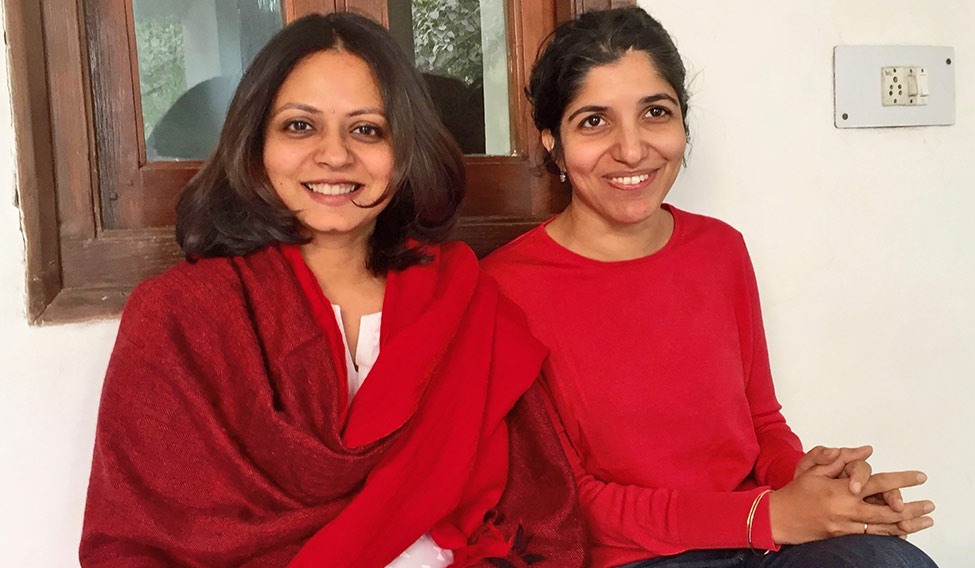Kalpana was at least fifteen years older than me, but it didn’t feel like that as we began to slowly tease each other and make wisecracks. As strange as it may sound, our training session started to feel like a date. And not just any date, a good one.
And thus begins Sunny Leone’s short story called Call Centre, about a relationship between an employee and his much older boss, part of a collection of her erotic short fiction called Sweet Dreams. More interesting than the content, however, was the packaging. The stories of Sweet Dreams were exclusively launched on the app of the digital-first publishing house Juggernaut in serialised form. So each story—a three-minute read priced at Rs7—was published at 10pm every night.
The Juggernaut app, launched in April this year with 100 titles, is a fantastic experiment in publishing. Founders Chiki Sarkar, 38, and Durga Raghunath, 37, wanted to tap the 220 million unique smartphone users in India, most of whom prefer to read on the smartphone and not the e-reader. So, Juggernaut allows you to download books or read them on a daily or monthly subscription of Rs15 or Rs299. Juggernaut started with a bang, offering an eclectic mix of subjects and writers— erotica by Leone, cricket commentary by Rajdeep Sardesai, thrillers by Praveen Swami and literary fiction and non-fiction by Arundhati Roy and William Dalrymple.
Sarkar is a former publisher of Penguin India and founder-publisher of Penguin Random House India. Raghunath was CEO of Firstpost and senior vice president of Zomato before co-founding Juggernaut. The journey began when Sarkar attended a book fair in London two years ago and heard about the publishing culture in Japan and China, where the “cellphone novel” was in demand. She felt that with distributors delaying payment, a successful book in India selling only around 3,000 copies and no book clubs or TV shows to promote sales, the publishing industry needed a massive makeover. On her return to India, she examined whether it was possible for Penguin Random House India—where she was working at the time—to make its books available on the phone. That’s when the idea for Juggernaut took root. She quit in 2015 and started brainstorming with Raghunath, who became her partner.
Raghunath calls Juggernaut the Netflix of books, where you can browse and sample the titles you like and then hone in on the book you want to read. Like shortlisting potential dates on Tinder, readers can bookmark the books they want to read. Payment, too, has been made as easy as paying for an Ola or an Uber ride. “Media problems have always interested me,” says Raghunath. “I think it was necessary to ask and understand why book readership was so low in India—whether smartphone users could find the format of the book relevant to their immediate needs.”
Asked whether Juggernaut is going to be a game-changer in the way youngsters read today, she says that they are not trying to change reading as much as try and make the new reader read longer and more often. “A lot of young people read a lot but they read in disaggregated forms across many browser tabs,” she says. “We are trying to say the chronology and structure of the book are relevant and here’s why they should try using a bite-sized approach. It might be new in India but the Chinese have done it successfully for a long time and so has the news business.”
To seduce the young reader, Juggernaut has reduced the baseline length of its books to around 20,000 words. Sales will be tracked real-time with authors finding out exactly how many copies of their books are being sold. Writers are also contractually obliged to spend 15 hours answering readers’ queries in the first three months. Readers are encouraged to rate the books they have read.
“From the point of view of writers, I think real-time data analysis and interaction with your readers are really good ideas as the more information you have the better,” says Samit Basu, author of The Simoqin Prophecies. “It is difficult to say whether this experiment in digital publishing will be successful as the whole industry is currently in flux and no one knows what the end point is going to be. It will take three or four years to judge whether Juggernaut has been able to achieve its goals.”
A selection of the digital books will be available as physical books so that in case the app doesn’t work, Juggernaut can fall back on its offering of physical books to make a profit. “This kind of experimentation with form and content has been the most challenging as well as the most rewarding part of the journey,” says Sarkar. “How to appeal to youngsters and make readers out of smartphone users? We’ve had to be agile, relevant and ready to break rules.”
Raghunath says that the app has done well. “The sampling has been good and the active users have become steady, so we might have the early makings of a habit.”
In future, the duo aims to make Juggernaut not just a reading but a writing space as well. Writers can post their original work on the app to be rated, critiqued and discussed. And from this spread, Juggernaut could pick up certain books for publishing based on popular response. If Juggernaut is successful in democratising the reading experience, then the whole process of editing and publishing could also change, with readers directly picking up books that have not been formally published. This means that everyone involved—readers, publishers, editors and writers—must change and up their game.







